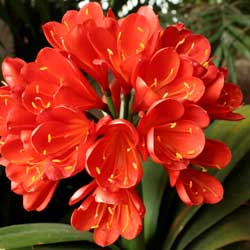Here’s another decorating idea for this holiday season… mix your poinsettias with clivias to create big, bold and beautiful displays. The emerald green of the clivia strap shaped leaves contrasts well with the many shapes and colors of the various poinsettias’. Colorful arrangements of the red, pink, golden “flowers” of the poinsettias mixed with the reds, oranges and yellow flowers of the clivias can be breathtaking. Best of all, long after the holidays, the brightly colored flowers, followed by bright berries, will brighten dark corners reminding us of the past holidays.
As one of the easiest plants to grow, clivias, also called “fire lilies,” have earned a place of honor as a “survivor plant.” Because they are native to forests in South Africa, their light requirement is very low. In fact, being too close to a west or south facing window may burn the plant. Watering requirements are minimal. It is important to water thoroughly, until water flows from the bottom of the pot. This removes accumulated salts and minerals and ensures all the potting mix is wet. This is especially important as the “roots follow the water.” If the potting mix is dry at the bottom of the pot, the roots will grow no further, possibly causing the plant to die. The soil mix should be very light and friable, with good aeration and drainage. Good medium or coarse orchid bark mix is perfect.
During the summer, clivias flourish outdoors in shady areas. Be sure to water thoroughly. Spring is a good time to divide if the plant is becoming too large for the pot.
When the outdoor temperatures drop, return them to the house before the temperatures dip below 40⁰F. Then, begin the process of stimulating flower buds by interrupting the growth cycle. Stop watering and cool for the next 25 to 30 days and nights. Keep the plant between 34° and 55° F. If the temperature exceeds this range, increase the cooling period. After 25 to 50 days, move to a location with temperatures between 65° and 75°F. Slowly resume watering and increase as active growth begins. As the flower bud develop, regularly turn the plant to prevent leaning.
Did you know? It’s possible to have clivias blooming nearly all year by growing several different species and varieties. Although most flower between February and May, Clivia gardenii blooms from fall through winter! So, go ahead…combine something tropical and traditional this year.


